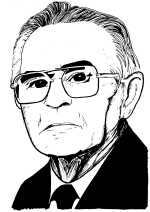Jaroslav Foglar
Jaroslav Foglar (6 July 1907 – 23 January 1999) was a famous Czech author who wrote many novels about youths (partly also about Boy Scouts movement) and their adventures in nature and dark city streets.
Foglar was born and grew up in Prague, capital of Bohemia. Because his father died prematurely he was brought up in rather poor material conditions by his mother. He was strongly influenced by romantic parts of Prague. All of the fictional towns in his novels are more or less derived from Prague. During the 1920s, Foglar was strongly influenced by German independent Wandervogel movement as well as Scout movement led by Antonín Benjamin Svojsík under Czech name Junák.
During the 1930s and 1940s, Foglar worked as a magazine editor in one of the largest Prague publishing houses, Melantrich. He edited several journals for youths:
and he wrote articles for other journals including the Skaut, Sluníčko, ABC, and the Tramp.
After the Communist coup in 1948 Foglar was kicked out of the publishing house, his magazines were liquidated and his books prohibited, as was the Scout movement and independent youth clubs. For many years he worked as a tutor in boarding schools and youth homes. During the fall of censorship at the end of the 1960s, he published some new books and re-editions of the older ones. After Soviet occupation of Czechoslovakia his books were once again banned until 1989.
Foglar lived with his mother caring for her until her death in high age and never married.
Although Foglar worked as a Boy Scout leader, his relation to the Scout movement was not straightforward. He basically pictured the Boy Scouts only in few of his novels (especially Pod junackou vlajkou a Devadesatka pokracuje), preferring to write mostly about his own invention, the boy clubs. Foglar's idea of independent boy clubs is basically derived from German Wandervogel movement. As editor of Mlady Hlasatel, Foglar systematically build clubbist ideology (based on friendship, good deeds, personal sacrifice, love of the nature, etc.) on some and traditions and own terminology. Clubs were small groups between 4 and 8 youths. Some of them were informally led by young men few years older than other youths, like Rikitan in novel Hosi od Bobri reky or by best of the youths - like 'exemplary youth' Mirek Dusin of Rychle Sipy Club. With Foglar's novels and magazine articles as examples, many Czech youths established such clubs. In the golden age of club movement, there were thousands of such independent clubs, which presented a type of Wandervogel-like alternative to the organized Scout movement. On the other hand, when Scouts were persecuted and forbidden during the German occupation between 1938 and 1945 and during Communism between 1948 and 1989 (with short exception of renewal of Scout during 1968 and 1969), boy clubs posed excellent informal alternative of youth life based on ideas similar to those of Scouts.
...
Wikipedia


